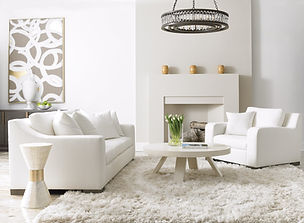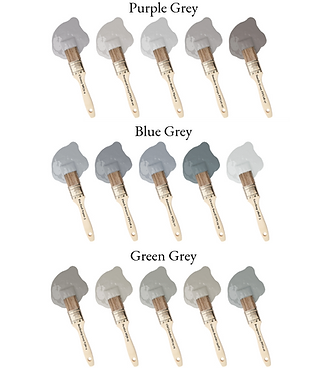Get the Design Inspiration you Need
Tips & Tricks
Tip# 1
-
Typical living room rug sizes are 8’x10′ and 9’x12′.
-
Make sure your rug is at least 6″ wider (8″ is ideal) than your sofa on both sides.
-
Typically run the rug the length of the sofa.
-
Give 30″ to 36″ of a walkway between large furniture pieces (if your living room allows for it) if not then at least 18″-24″. That will help to inform your rug size.
-
Measure out your desired rug size with painters tape to get a sense of how it will feel. It's a lifesaver!
Picking the Right Size Rug

Learn more about picking the right rug size HERE

Tip# 2
Perfect Picture Height
To ensure your artwork looks amazing regardless of who's gawking at it, the standard height for hanging artwork at eye level is 57” from the center of your photograph to the floor. And If this seems low to you, know that you can get away with hanging your art or photographs a little higher at 60”.
Learn more about picking the right pieces of artwork HERE
Tip# 3
Choose Quality over Quantity
Decorating doesn’t have to cost a fortune. However, inexpensive buys often lead to quicker wear and decreased longevity. Instead, save up for something that will last decades as opposed to something that will fray within a year or two. Set up a budget and saving plan then you can spend on grounding pieces like a dining table, chairs, console, and most importantly, a sofa.
Learn more about picking quality furniture HERE

The 70/30 Rule
A simple rule of thumb many interior designers follow is the 70:30 hack for decorating a room. 70% of the room in one style and 30% is another. This mix of 2 or more styles creates a unique and eclectic look making the space more personal and individual, bringing your own personalized style signature.


Working with Colour
Look HERE for more helpful Colour Tips
1. Picking the Best Grey
Cool grays will have a blue, purple and green undertone, while warm grays will have a yellow, red, or brown undertone to them.
If you paint an area in your home a cool gray, you’ll give your space a more light, airy and relaxed feeling. Warm grays are the perfect background for a cozy, earthy, and sophisticated feel. Click HERE for more info.
3. Go with your Gut
Finding a complimentary colour palette is one thing, and liking it is another. Remember, you’re going to have to live with your colour choice for some time, unless you want to experience the expense of redecorating again soon.
Don’t get too hung up on the colour wheel or trends. Make sure your colour selection is in line with your personal tastes too.
2. Seek Inspiration
The first step to choosing the right colours for your interior, before you even walk into a paint store, should be sourcing inspiration far and wide. Start with what you already have in the room. Look at the upholstery of your furnishings, the flooring and your accessories including artwork. Draw clues from your interior to help strengthen your colour palette.
4. The 60/30/10 Rule
Most of the colour in your space typically comes from the walls. If you’re wanting to create more interest in your interior, try the 60/ 30/10 decorating rule. That’s 60% of your space is the walls, 30% upholstery, flooring and window treatments, and 10% decorative elements such as cushions, accessories and art.
Disclaimer: any and all advice given and shown on our page comes from other reputable designers and known interior enthusiasts. We are not responsible for any decision you take that you don't find helpful. Take what inspiration and advice you'd like to use and know that at the end of the day, you have the final decision in what you do and how you want your home to look.


